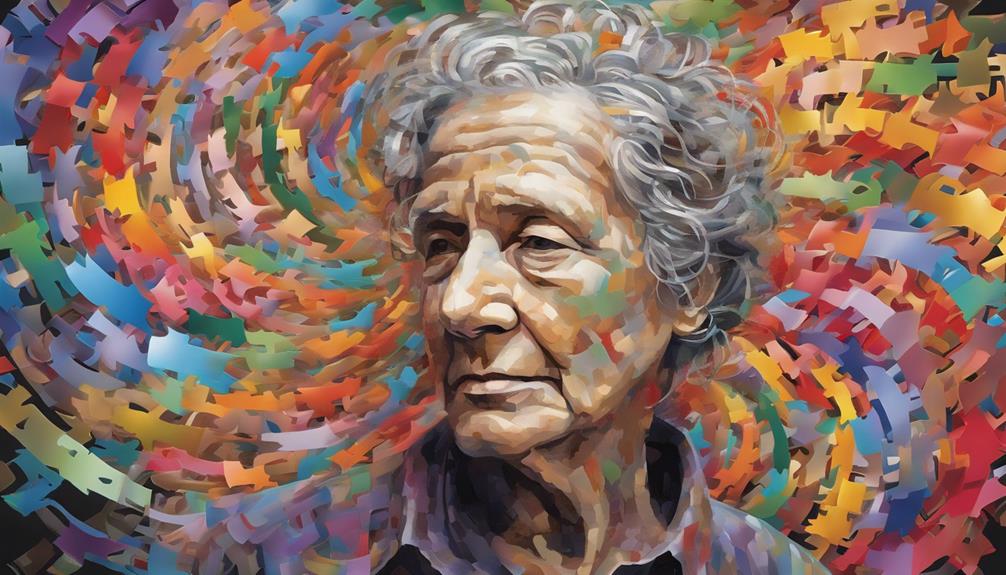In a world where memories fade as fast as leaves in autumn, we discovered a moving piece that truly touches the soul. The words in ‘Do Not Ask Me to Remember’ inspire us to delve into the profound depths of emotional bonds and the human spirit, even when faced with the unyielding grasp of dementia.
As we journey through the labyrinth of verses, we uncover a treasure trove of insights waiting to be unearthed, offering a glimpse into the profound impact of poetry on the human spirit.
The Art of Dementia Poems
Exploring the intricacies of crafting dementia poems reveals a profound journey of empathy and understanding. Within the walls of a care home, where every heartbeat echoes a story of resilience, dementia poems serve as windows into the souls of those affected by memory loss. Caregivers, amidst the challenges and joys, find solace in the verses that speak of their unwavering love and dedication. Through the lens of poetry, the complexities of navigating life with dementia are laid bare, highlighting the importance of patience and compassion in every interaction.
In the quiet moments shared between caregivers and residents, poetry becomes a bridge connecting past and present, weaving a tapestry of shared memories and emotions. The care home transforms into a sanctuary where words carry the weight of unspoken feelings, offering comfort and understanding to all who dwell within its walls. As poets craft verses that echo the humanity present in every caregiving journey, they illuminate the path towards a future filled with empathy and grace.
Expressing Emotions Through Poetry

Delving into the realm of dementia caregiving through poetry offers a poignant avenue for expressing intricate emotions and navigating the complexities of this journey with grace and understanding. Poetry serves as a heartfelt medium to articulate the myriad of feelings that arise in the realm of dementia care.
These poems provide a raw and authentic glimpse into the emotional rollercoaster that comes with looking after loved ones with dementia. Through verses that echo personal insights and reflections, individuals can share their coping mechanisms and shed light on the profound impact dementia has on relationships.
The poems often underscore the significance of love, patience, understanding, and the dire need for support in the challenging terrain of dementia care. By encapsulating these experiences in poetic form, caregivers not only find solace in their expression but also create a platform for raising awareness, fostering empathy, and forging connections with others walking similar paths in the realm of dementia care.
Impact on Dementia Awareness
As we reflect on the emotional depth captured in dementia poems, it becomes evident that these poetic expressions play a pivotal role in raising awareness about the challenges faced by individuals living with the condition and their caregivers. Through the power of poetry, we can shine a light on the struggles, emotions, and realities of those impacted by dementia. Here are three significant ways in which dementia poems impact awareness:
- Educating about Care Challenges: Dementia poems provide insights into the daily hurdles faced by both individuals with dementia and their caregivers. They shed light on the need for patience, understanding, and specialized care to support those living with the condition.
- Promoting Compassionate Care: By sharing personal experiences and emotions through poetry, individuals can cultivate a deeper sense of empathy and compassion towards those affected by dementia. This heightened awareness encourages a more caring and supportive environment for individuals and their caregivers.
- Inspiring Supportive Communities: Dementia poems foster a sense of community and solidarity among individuals touched by the condition. They encourage open discussions, mutual support, and initiatives to improve dementia care practices, creating a more compassionate and inclusive society.
Finding Comfort in Poetic Verses

Finding solace in poetic verses, individuals touched by dementia can often discover a sense of understanding and connection amidst the challenges they face. I've always found that poetry has this incredible ability to convey emotions and experiences in a way that resonates deeply with the heart. When it comes to dementia, these verses become even more poignant, offering a glimpse into the complex world of those living with the condition and their caregivers.
I've always believed that poetry has a unique power to provide comfort and healing during difficult times. The emotional insights shared through dementia poems help us navigate the rollercoaster of emotions that come with caregiving. They remind us of the importance of love, patience, and empathy in supporting individuals with dementia. Through these verses, we can better understand the impact of dementia on relationships, memories, and communication, fostering a greater sense of awareness and compassion for those affected by this challenging condition.
Empathy and Solace in Words
In understanding the emotional complexities of dementia, we're drawn to the solace and empathy found within the heartfelt words of poetry. Through these poetic expressions, we can truly grasp the depth of the experiences faced by individuals and caregivers dealing with dementia.
- Validation in Shared Emotions: Poems on dementia offer a profound sense of validation, allowing individuals to feel understood and connected in their struggles and triumphs.
- Empathy for the Journey: These poems reflect the challenges and joys of caring for loved ones with dementia, fostering empathy and understanding among readers towards those navigating this difficult journey.
- Community and Support: By emphasizing empathy, patience, and understanding, these poems create a sense of community and support for individuals affected by dementia, reminding them that they aren't alone in their experiences.
In the realm of dementia, where communication can be complex and emotions intense, finding solace and empathy in the power of poetic words can offer a beacon of light and understanding in the midst of uncertainty.
Frequently Asked Questions
What Is the Poem About Dementia?
We understand the impact of dementia on relationships and memories. It challenges us to navigate through the emotions and coping mechanisms.
Raising awareness and involving youth is crucial for understanding dementia.
We've experienced the emotional journey of caring for loved ones with dementia. It's a poignant reminder of the importance of empathy and support for those affected by this condition.
What Are 3 Things Not to Say to Someone With Dementia?
When speaking to someone with dementia, it's important to be mindful of our words and actions. Three things we should avoid saying are:
- 'You should remember this'
- 'Do you remember me?'
- 'You're wrong'
These phrases can cause frustration, anxiety, and agitation in individuals with dementia. Instead, we should:
- Use simple language
- Avoid rushing them
- Offer support and reassurance in a compassionate manner.
What Is the Average Age of Death for Someone With Dementia?
We've learned that the average age of death for someone with dementia is typically around 80 years old.
It's essential to remember that individuals with dementia often have a shorter life expectancy due to complications like infections and falls.
Factors such as the type of dementia, overall health, and access to quality care can influence their age of death.
Caregivers play a crucial role in providing support and ensuring a dignified end-of-life experience for those with dementia.
What Stage of Dementia Is Sundowning?
Sundowning is a symptom of mid to late-stage dementia. It often brings increased agitation, confusion, and behavioral changes in the late afternoon or evening. Though the exact cause isn't fully understood, disruptions in the body clock or changes in brain function may play a role.
Caregivers can help manage sundowning by maintaining a consistent routine, reducing noise and stimuli in the evening, and creating a soothing environment for those with dementia.
How Can Dementia Poems and Tattoos Help in Expressing Emotions and Memories?
Dementia poems and meaningful dementia tattoos symbolizing love can be powerful ways to express emotions and memories. Both can serve as a tangible reminder of love and connection, providing comfort and a sense of continuity for those coping with the challenges of dementia.
Conclusion
As we reflect on the power of dementia poems like 'Do Not Ask Me to Remember,' we're reminded of the deep emotional journey faced by those affected by Alzheimer's disease. Through the art of poetry, we can express complex emotions, raise awareness, and find solace in shared experiences.
Can words truly capture the essence of love, patience, and understanding needed to support individuals living with dementia? Let's continue to embrace empathy and compassion in our caregiving journey.









